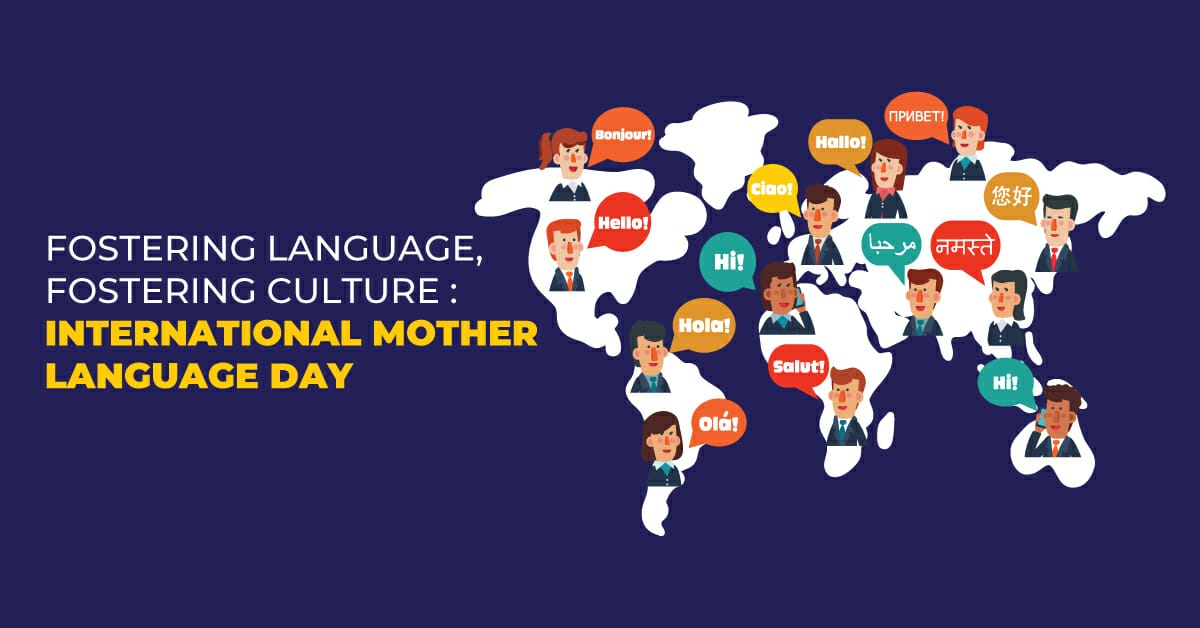FOSTERING LANGUAGE , FOSTERING CULTURE : INTERNATIONAL MOTHER LANGUAGE DAY
 Posted On
Posted On
492 total views, 1 views today
“If you talk to a man in a language he understands, that goes to his head;
If you talk to him in his language, that goes to his heart”.
: Nelson Mandela
Language is the focal point, on which our communication revolves. From time immemorial, human beings have adapted cognitive communication to share their thoughts, ideas and expressions. Language is that medium of cognitive communication which enables the humans to build relations with each other. Language can build societies, as well set them apart from each other. Therefore, language is very close to one’s own heart and the building block of socialization. However, A child learns his or her first words from the family or mother in the native language which is known as the mother tongue and thus it goes on building his overall personality. Well, no matter we are versed in multiplicity of communication, our best version or self comes out only when we speak in our mother tongue. Be it in emotion, motion, communication, anger, love, hatred or dream, we all convey and pour out our hearts fully in our native tongue, our own mother language. Hence, on this 21st February, International Mother Language Day, let us recapitulate the history and importance of the day once more!
HISTORY OF THE DAY
International Mother Language Day is a worldwide observance day held every year on 21st February. It was first adopted by UNESCO on 17th November 1999 and later United Nations General Assembly recognized it in 2002, with the adoption of UN Resolution. The observance of the day goes back to the tribute of the Language Movement by the people of Bangladesh, then as East Pakistanis. In 1948, the government of Pakistan declared Urdu to be the sole official Language of the country, denouncing Bengali or Bangla language, spoken by the half of the population of East Pakistan (now Bangladesh). In protest against this, Dhirendranath Dutta from East Pakistan raised the demand of making Bangla atleast one of the national languages in addition to Urdu. The University of Dhaka students organized massive rallies, protests and meetings, with support of the general public. On 21st February, 1952, government opened fire on the protesters and the rallies. Some died and hundreds were injured. This is one of those rare incident in history where people sacrificed their lives for the sake of their mother language.
OBSERVANCES AND AWARDS
To commemorate the sacrifice of the Shaheeds on 21st February 1952, every year on the same day International Mother Language Day is celebrated . The UNESCO adopts a theme every year to facilitate for the cultivation of language and culture among the common mass. This year, the theme is “Fostering Multilingualism for inclusion in education and society”. The main purpose of the day is to promote awareness for language and cultural diversity across the world. The 4 students who died in 1952 to protect their mother language are remembered for their immortal sacrifices in Bangladesh and elsewhere. The Linguapax Prize is awarded annually on 21st February by the Linguapax Institute of Barcelona for the preservation of linguistic diversity and promotion of multilingualism. In our country too the day is observed through various writings, literature fests, poetries and also through digital content initiatives as well as the National Education Policy held recently by the ministry.
Mother language is important for development of cognitive personality of a child as well as enabling him better to understand his curriculum. We have to remember that preservation of our language leads to preservation of our cultural identity and in turn benefitting and inclusion of each and all within the larger scope of education and learning. Thus as author Brigham Young mentioned, “See that your children are properly educated in the rudiments of their mother tongue, and then let them proceed to higher branches of learning”.



